-
CENTRES
Progammes & Centres
Location
The Pashtun Tahafuz Movement is difficult for India to support because the movement owes its success to the absence of foreign funding or support.

Pakistan’s Pashtuns have stirred up a storm again and the army is now desperate to control it. The DG ISPR, Asif Ghafoor, the spokesperson for the Pakistan army, recently suggested that the Pashtun Tahafuz Movement receives funding from the Indian and Afghan intelligence services and ‘warned’ the Pashtun population to not take heed of the movement’s rhetoric. The statement is unsurprising and predictable, given that Pakistan has always looked to place the blame on someone else, for problems of their own creation.
Pakistan repeatedly blamed India and Afghanistan for stoking ethno-national sentiments within its nation. As a nation it has always projected Islam and Urdu as the common denominator among the different groups of the state, ignoring the ethnic and linguistic diversity of its people. Any assertion of ethno-linguistic identity for seeking political rights, be it the Baloch, Bengali or Pashtun, is seen as contentious and against the very idea of the state. The creation of Bangladesh cemented the idea that India was out to destroy, divide and break up Pakistan and that it would continue to apply pressure on Pakistan where it hurts. When Prime Minister Narendra Modi raised the issue of the Baloch, in August 2016, it was seen as a validation of this belief.
A movement such as the Pashtun Tahafuz Movement (PTM) is difficult for India support, not because it has the potential to backfire in terms of increased support for Kashmiri and Khalistan militants, but because the movement has been successful only due to the absence of foreign-state funding and support. The mass gathering of Pashtuns in different parts of the country is unprecedented and cannot be “bought” or “paid for”. Pashtuns are gathering in large numbers to join in the movement, by listening and sharing their grievances against Pakistan’s military and political policies toward them. Decades of regressive laws, militarisation and violence at the hands of the Pakistan army in the Pashtun homeland has united them, and has allowed the PTM to take the shape it has today.
The PTM is demanding a removal of arbitrary check posts and landmines that are scattered across the tribal belt, a return of “missing people” and set up of judicial inquiry to find those who have been picked up by the Pakistan military over the years and an end to the military subjugation of their home. While these seem straight forward and justified, the state has misconstrued them as deceitful and treasonous. Asif Ghafoor’s statement reflects that. While Prime Minister Imran Khan and the army have acknowledged that work needs to be done to improve life in the Pashtun tribal belt, they also believe that they are not only faultless for the Pashtun’s problems, but that the actions of the PTM are anti-state.
The movement began as a sudden reaction to the extra-judicial killing of a young Pashtun model in Karachi in January 2018. Naqeebullah Mehsud’s death at the hands of the military prompted many in his hometown of south Waziristan, to gather and protest against his killing. The movement quickly spread across the tribal belt and into other parts of the country, holding large rallies in Peshawar, Lahore, Karachi, Quetta, Swat, Dera Ismail, Bannu and Islamabad. Groups of Baloch and Hazara people have also attended the PTM gatherings, as minorities that have been at the receiving end of state’s suppression. The fact that the movement’s message and demands find resonance across the country, has given the military-intelligence establishment nightmares.
The idea of Pashtunistan, a unified nation for Pashtuns that straddle the Afghan-Pakistan border, has been a national movement in the region predating the creation of Pakistan. The PTM’s success gives rise to fears of a secessionist movement, one that will not only break up the country but threaten other ethnic groups to further assert their identity.
The PTM remains an entirely non-violent movement, one that is not working to secede or destroy the state. In fact, it works within the democratic polity of the state, simply demanding for a return of its constitutional rights. Should there be evidence of any foreign funding, support for the movement will plummet and leaders of the PTM are well-aware of that. Manzoor Pashteen, the figurehead for the movement has continuously reiterated his belief that the solution to the Pashtuns’ problems should be found within the constitution. He does, however, openly criticise the army, something no Pashtun party has done in the past. This has led to a media clampdown on any reportage of the movement, arbitrary arrests of its leaders on charges of terrorism, suspicious deaths of some members, and of course a blame game involving India.
The military will continue to do everything it can to muzzle the movement. Since it has already gone so far as to classify citizens protesting injustices, as anti-state, it will perhaps push the PTM further, accusing it of stoking sectarian, communal flames or terrorism. While the ruling Pakistan Tehreek-e-Insaf has already made offers of party tickets to PTM leaders in last years’ election, the PTM strength lies in the fact that is a civil rights movement, not a political ideology.
Pakistan continues to believe that India is the hand of God, directing everything wrong that is happening in its nation, without seeing reality for what it is. The military would find it more prudent to deal wholeheartedly with the Pashtun grievances now, than wait until the movement evolves into something stronger and more assertive. Cracking the military whip against the Pashtuns once again, will force the Pashtuns’ and other ethnic minorities’ hand, complicating matters for the army itself.
This commentary originally appeared in The Print.
The views expressed above belong to the author(s). ORF research and analyses now available on Telegram! Click here to access our curated content — blogs, longforms and interviews.

Kriti M. Shah was Associate Fellow with the Strategic Studies Programme at ORF. Her research primarily focusses on Afghanistan and Pakistan where she studies their ...
Read More +